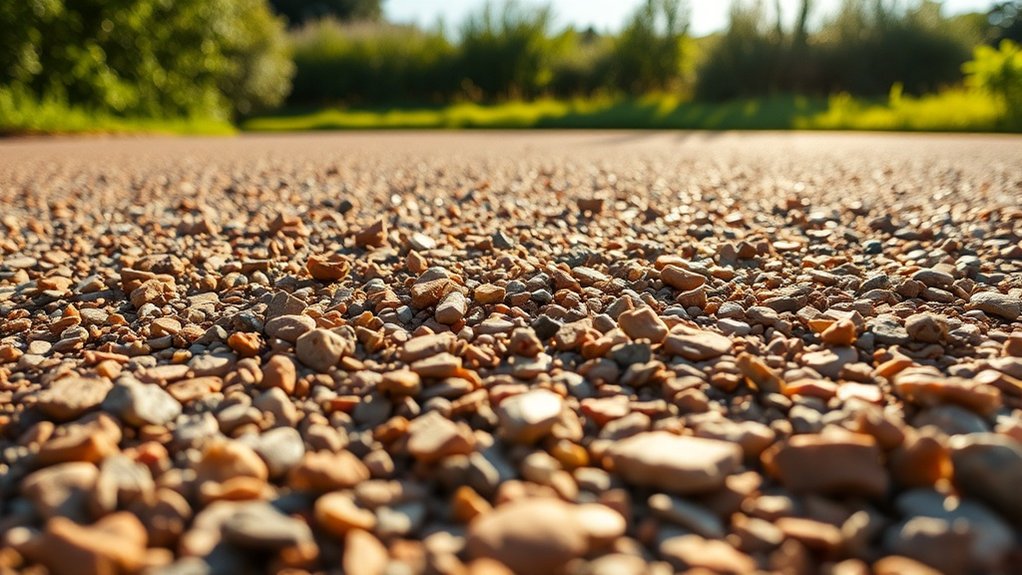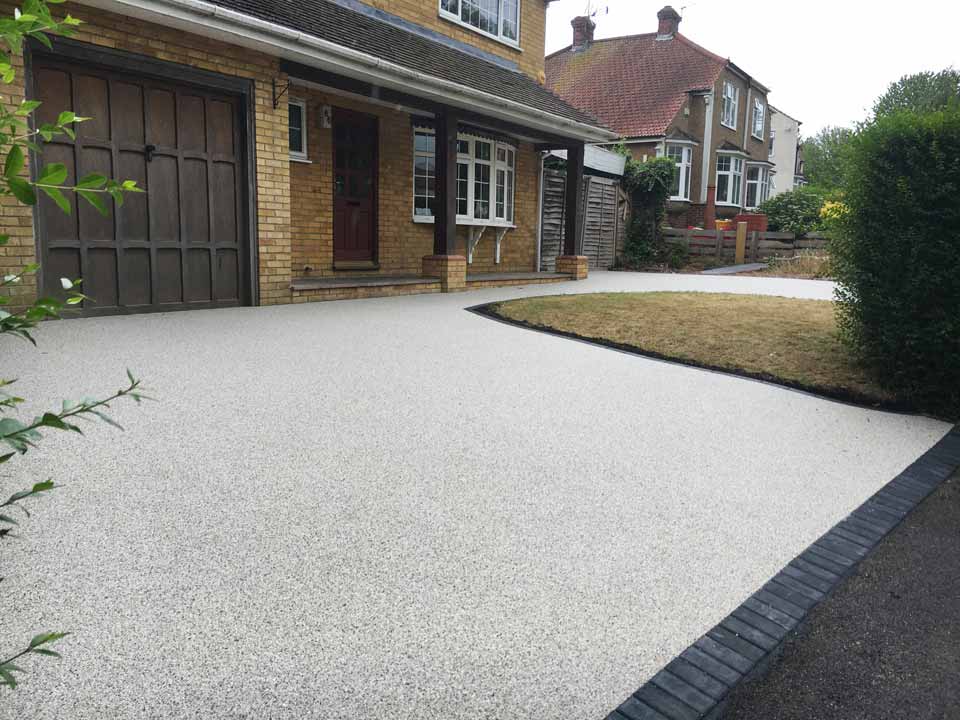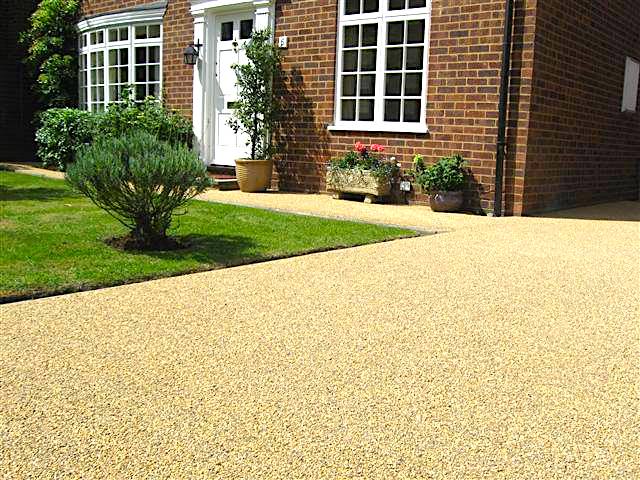For a resin driveway, a compacted MOT Type 3 sub-base is your best choice. It offers excellent stability and drainage, complying with permeability standards. Ensure proper compaction for even load distribution, which is vital for the driveway’s longevity. Thickness should range from 100mm to 250mm, depending on soil conditions, and take local climate into account for optimal performance. Following these guidelines will help you create a durable surface.
Table of Contents
ToggleKey Takeaways
What Is the Best Sub-Base for a Resin Driveway?
- Compacted MOT Type 3 is the best choice for a resin driveway. It creates a strong, permeable base that promotes effective drainage.
- Using angular gravel or crushed stone improves both permeability and stability, making it an eco-friendly option for residential driveways.
- Aim for a minimum thickness of 100mm for the sub-base to avoid cracking and ensure proper compaction.
- Steer clear of unsuitable materials like block paving or soil, as these can result in a weak surface that cracks under the weight of vehicles.
- Consider installing geotextile membranes to prevent weeds and soil migration, which helps extend the lifespan of your resin driveway.
Understanding Sub-Bases and Bases
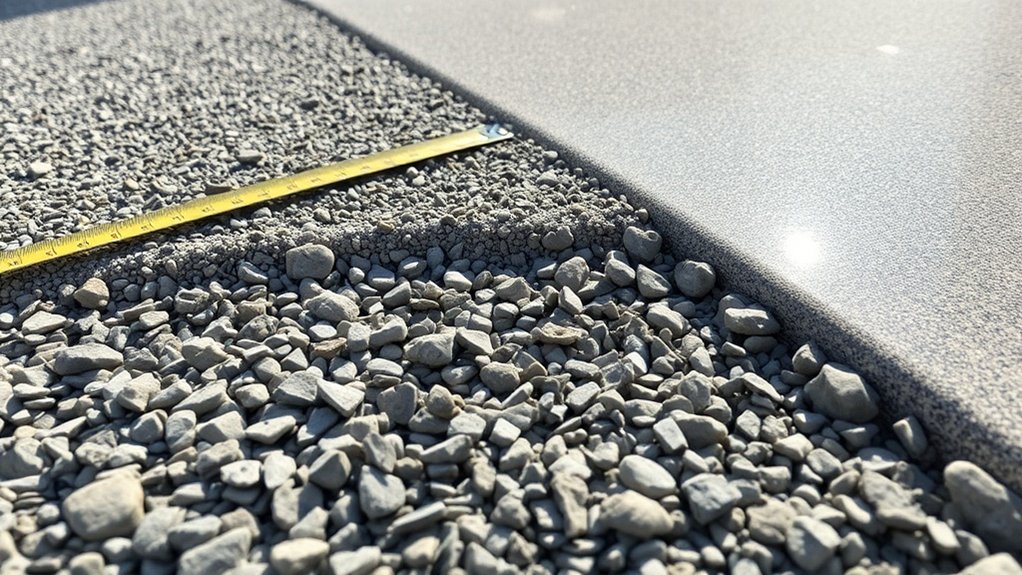
Understanding the role of sub-bases and bases in road construction is crucial for durability and performance. The sub-base sits above the subgrade and helps distribute traffic loads, preventing soil overstressing. It also aids in drainage, frost protection, and provides a stable platform during construction. Granular base and subbase are compacted aggregate layers that play a vital role in ensuring the longevity of pavement structures. A solid sub base is vital for durable resin driveway installation, as it enhances the overall stability and prevents structural issues.
The base layer, made from higher-quality materials, directly supports the road surface. Its main job is to handle heavy wheel loads and ensure stability under traffic. Various types of sub-bases, usually consisting of well-graded aggregates, assist in load distribution and help avoid uneven settlement. Together, these layers create a strong system that enhances the lifespan and reliability of the road structure.
Recommended Sub-Base Materials
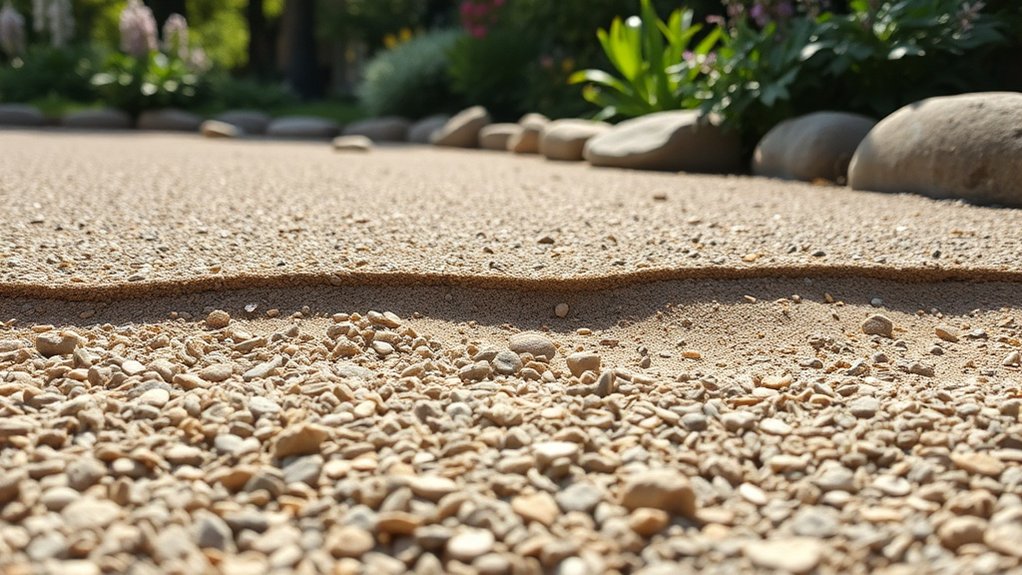
When choosing sub-base materials for a resin driveway, it’s important to consider the needs of your project. Compacted MOT Type 3 is a strong option, providing a solid foundation and meeting permeable base standards for SuDS compliance. For driveways that will see heavy traffic, compacted Type 1 aggregate is recommended due to its excellent load-bearing and drainage capabilities. If you’re prioritising permeability, angular gravel or crushed stone is eco-friendly and allows for better water infiltration. For non-permeable options, MOT Type 1 works well when properly sloped. Lastly, open textured tarmac is a budget-friendly, permeable choice that cures quickly. A solid foundation ensures long-lasting performance and prevents structural issues. Properly compacted and level layers will also prevent movement and enhance the durability of your driveway. Choosing the right sub-base will ensure your driveway stands the test of time.
Importance of Compaction
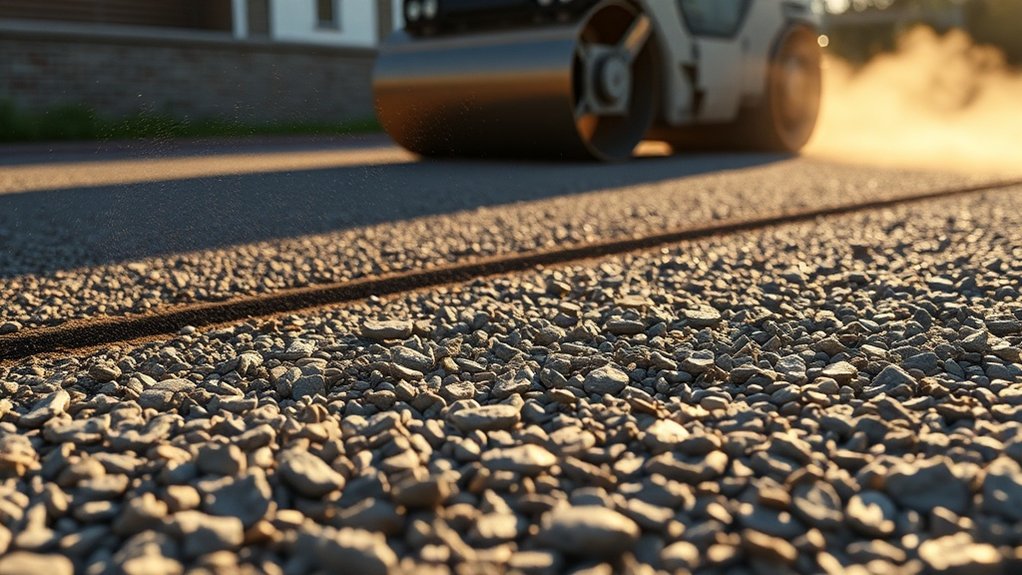
Compaction is crucial for the success of a resin driveway installation. Using effective compaction techniques ensures that your sub-base can evenly distribute loads, which helps to prevent cracking and sinking. Proper compaction increases density, minimises air voids, and enhances structural integrity, all of which are vital for the durability of the resin layer. Additionally, a well-constructed sub-base is essential for overall system strength, as it supports the weight of vehicles and prevents future issues. Poor compaction can result in uneven surfaces and higher maintenance costs. A well-prepared sub-base is essential for driving stability, as it supports the weight of vehicles and prevents future issues.
Here’s a quick overview of compaction equipment and methods:
| Compaction Equipment | Application |
|---|---|
| Plate Compactors | Ideal for small to medium projects |
| Roller Compactors | Suitable for larger areas |
| Mechanical Methods | Employ multiple passes for density |
| Moisture Control | Key for effective compaction |
| Density Testing | Ensures uniform surface hardness |
Investing in proper compaction will significantly extend the lifespan of your driveway.
Permeability for Stormwater Management
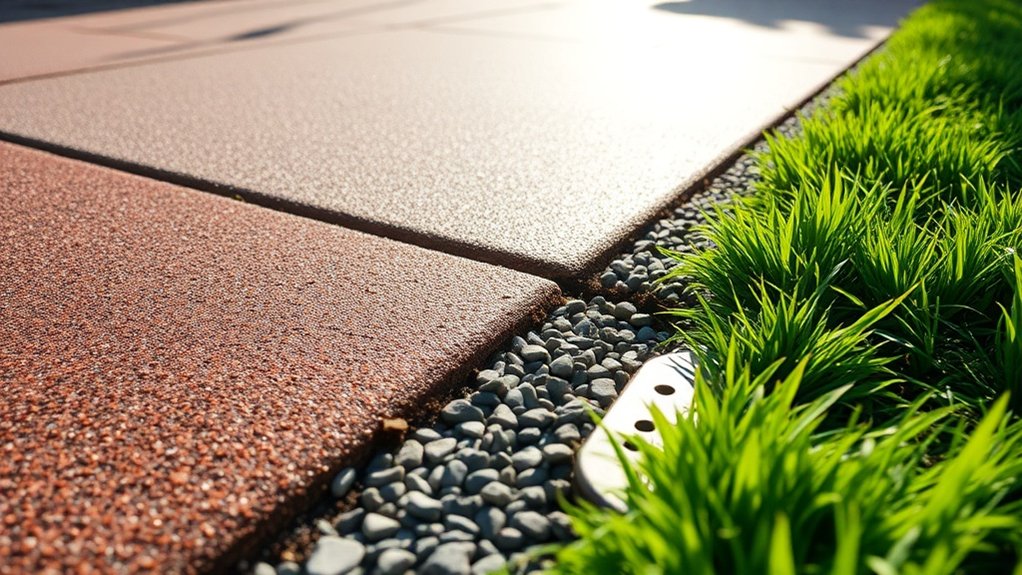
A well-compacted sub-base is crucial for effective stormwater management, as permeability is key to a functional drainage system for your resin driveway.
Using permeable sub-bases, like porous concrete or open-graded tarmac, improves drainage by allowing stormwater to infiltrate quickly, which significantly reduces surface runoff. This helps retain water in the soil, lessening urban heat islands and aiding groundwater recharge.
To comply with Sustainable Urban Drainage Systems (SuDS), select materials that maintain permeability, such as angular crushed stone in a compacted type 1 aggregate base.
Regular maintenance, like vacuuming, will help prevent clogging and ensure the drainage system remains efficient, promoting the long-term performance and durability of your resin driveway.
Load-Bearing Considerations
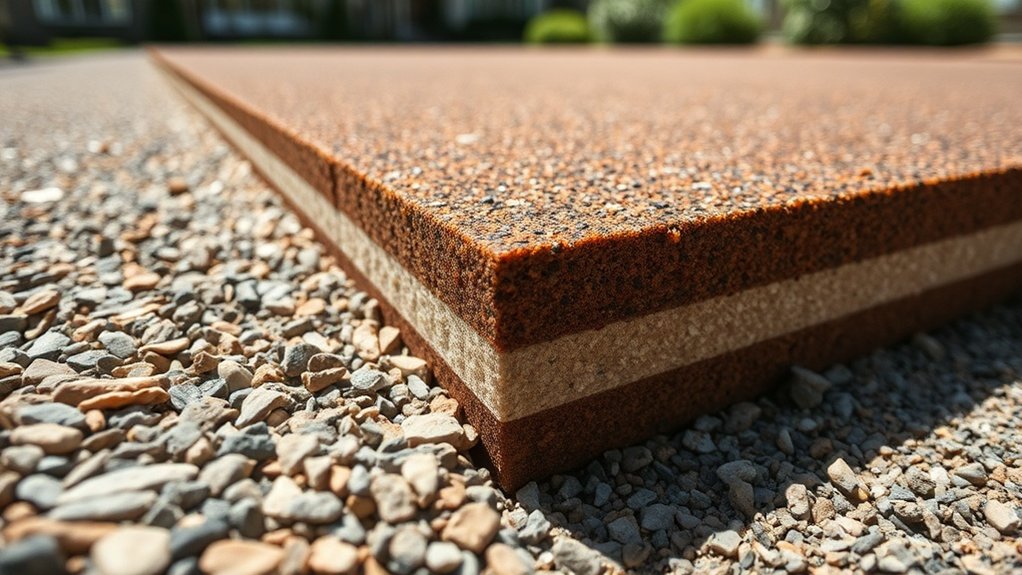
To ensure your resin driveway can support the expected traffic loads, it’s crucial to consider the load-bearing capacity of the sub-base. An effectively designed sub-base provides stability and proper weight distribution.
Here are some important points to keep in mind:
- Material Strength: Opt for a concrete sub-base (C35, 100mm thick) to ensure high load-bearing capacity.
- Thickness: For residential driveways, a minimum thickness of 100mm is recommended, while commercial applications may require up to 250mm.
- Compaction: Ensure materials are properly compacted to avoid deformation and settlement under heavy loads.
- Geotextile Membranes: Adding these can help stabilise the sub-base and prevent sinkage.
Slope and Drainage Requirements
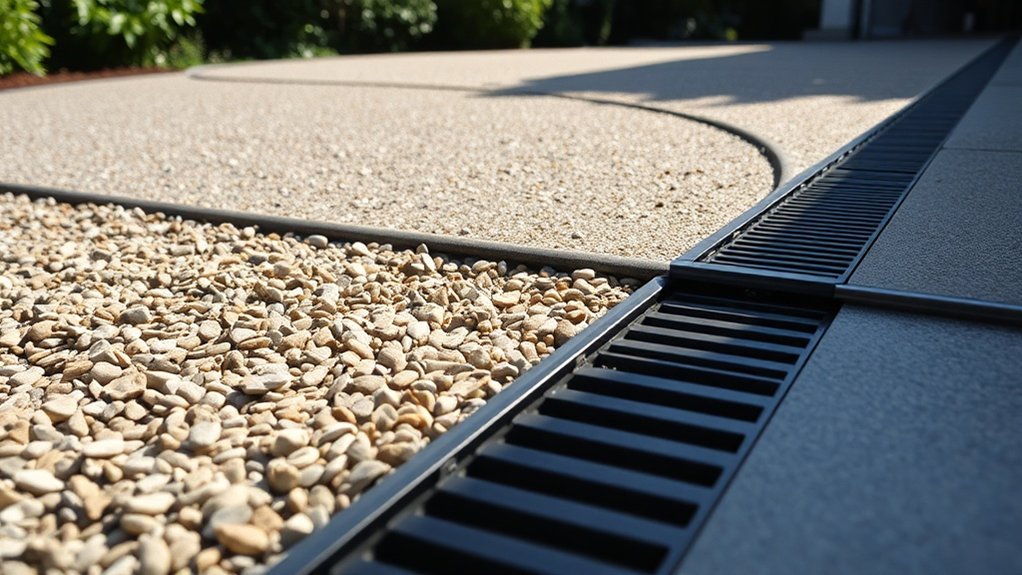
When designing a resin driveway, it’s crucial to focus on slope and drainage to avoid problems like water pooling and material damage.
Aim for a slope of around 2% to ensure effective drainage and minimise erosion. Slopes of up to 5% are workable, but anything over 10% needs careful attention to maintain stability and ensure even resin coverage.
Use a permeable, well-compacted sub-base to promote efficient runoff, and consider SUDS-compliant drainage options like channel drains or soakaways.
Proper grading and diversion channels can further improve water management, enhancing the durability and performance of your resin driveway.
Preparation Essentials for Installation
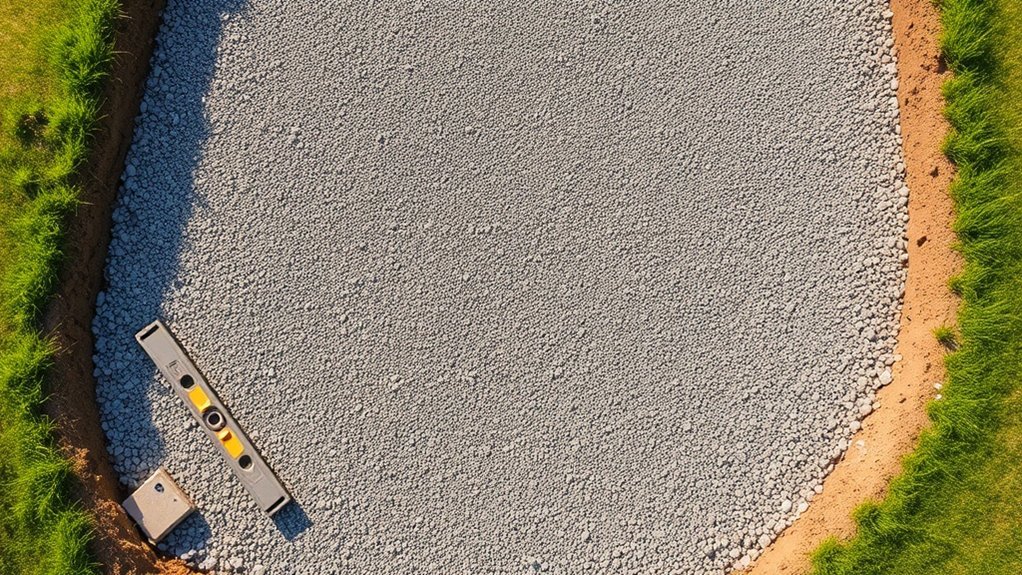
Before installation, ensure your sub-base meets the minimum thickness requirement to adequately support the resin driveway.
It’s crucial to level the surface, as any unevenness can cause drainage problems and lead to cracking.
Also, take moisture control measures to protect the sub-base and enhance resin adhesion.
Minimum Thickness Requirement
Minimum Thickness Requirement for Resin Driveways
To ensure a resin driveway is durable and stable, adhering to minimum thickness requirements is crucial. Here are the key specifications to consider:
- Base Layer Thickness: A minimum of 100mm is essential for proper support.
- Sub-Base Thickness: Typically between 100mm and 250mm, depending on the soil conditions in your area.
- Compaction: Ensure both the base and sub-base layers are compacted well to avoid any uneven surfaces.
- Geotextile Membrane: Using this can help prevent weed growth and stop soil from migrating.
Surface Leveling Importance
Proper surface leveling is crucial for the durability and effectiveness of a resin driveway. A flat and even surface not only enhances safety by reducing the risk of slips but also improves the overall look of the driveway.
Start by cleaning the substrate thoroughly to remove any debris and contaminants, which helps ensure strong adhesion. Repair any cracks or holes, and use MOT type 1 roadstone to create a solid, level base.
Tools like mechanical whacker plates or vibratory compactors can significantly enhance compaction and uniformity.
Maintain gradients between 1:12 and 1:40 for effective drainage while ensuring stability. Finally, tape the edges to prevent resin bleed and check that all fixtures are flush with the base.
This careful preparation will result in a durable and attractive driveway that lasts for years.
Moisture Control Measures
Effective moisture control is crucial when installing a resin driveway, as poor management can lead to lasting problems.
Here are some key points to consider:
- Moisture Testing: Use a hygrometer to keep humidity levels between 30-85%.
- Barrier Installation: Fit moisture barriers to stop water from seeping into the resin layer.
- Drainage Evaluation: Check and improve existing drainage systems to handle excess water properly.
- Substrate Selection: Opt for sub-base materials like aggregate that help manage moisture effectively.
Unsuitable Sub-Base Materials
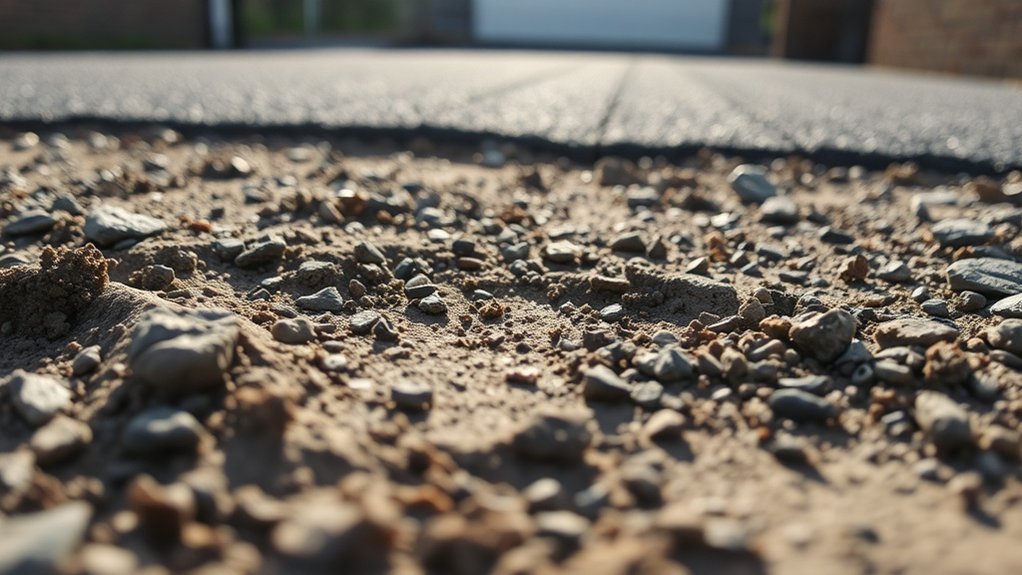
Choosing the right sub-base material is crucial for the durability and performance of a resin driveway.
Avoid block paving, as its many joints can transmit stress and lead to cracking. Paving slabs are also unsuitable due to their instability, which can cause surface cracks and drainage issues.
Gravel and loose aggregates are problematic as they fail to compact properly, resulting in shifting and uneven surfaces that can damage the resin.
Soil can pose challenges as well; organic matter breaks down over time, leading to instability and root growth that disrupts the resin layer.
Lastly, using a thin layer without proper compaction can increase the risk of cracking under vehicle weight.
It’s essential to choose a strong sub-base to ensure the longevity of your resin driveway.
Environmental Compliance and SuDS
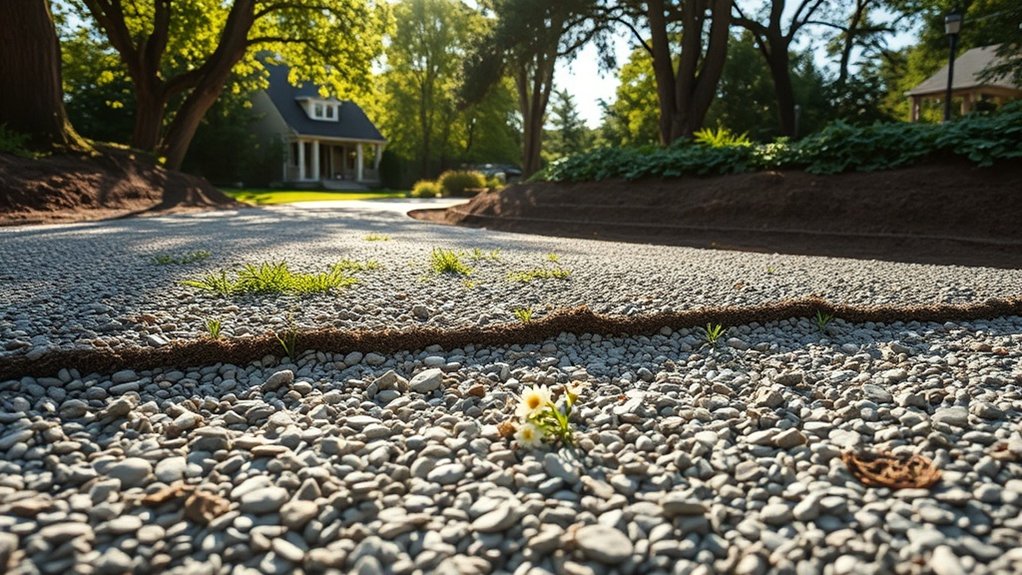
Selecting the right sub-base materials is crucial for a resin driveway’s durability and for adhering to environmental regulations, particularly those set out in Sustainable Urban Drainage Systems (SuDS).
To ensure compliance with stormwater regulations, keep the following points in mind:
- Opt for porous concrete sub-bases to allow water to infiltrate easily.
- Use open-grade aggregates, such as Type 3 MOT, for added structural support.
- Steer clear of traditional impermeable materials that obstruct drainage.
- Ensure the sub-base can handle expected vehicle loads while maintaining permeability.
Regional Considerations for Sub-Bases
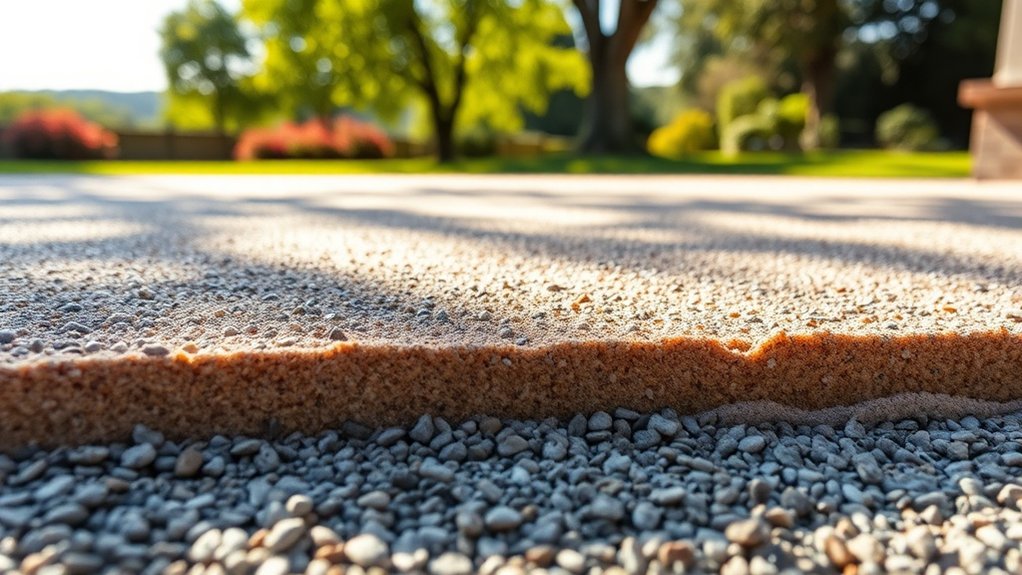
When choosing a sub-base for your resin driveway, it’s important to consider your local climate and soil conditions.
In colder areas, opt for frost-resistant materials to prevent damage from freezing temperatures. Conversely, in milder regions, you might manage with a thinner sub-base.
Additionally, knowing your soil type will help determine the best compaction methods and whether you need extra stabilisation layers to ensure your driveway remains strong and durable.
Climate Impact on Materials
Understanding how climate affects sub-base materials is crucial for ensuring the durability and performance of resin driveways. The materials you choose can significantly impact their resistance to various climate challenges.
Here are some key factors to consider:
- Temperature Extremes: Permeable concrete and Vuba Mac offer stability, whereas tarmac can soften in hot weather and become brittle when it’s cold.
- Rainfall: In areas prone to heavy rain, permeable sub-bases are essential to prevent flooding, as non-permeable bases can trap water.
- Freeze-Thaw Cycles: Well-draining sub-bases help minimise damage caused by freeze-thaw cycles, enhancing overall durability.
- UV Exposure: Resin-bound surfaces are resistant to UV degradation, while tarmac may require more upkeep in sunny conditions.
Choosing the right materials is key to ensuring optimal performance and longevity in various climates.
Local Soil Conditions
Local soil conditions are crucial when choosing the right sub-base for resin driveways. Different soil types, like clay, sand, or loam, impact your decision. For example, clay soil requires a more stable base due to its instability.
Proper drainage is vital, especially in areas with heavy rainfall or poor drainage. Using permeable sub-bases can improve water management and ensure compliance with SUDS regulations, helping your driveway last longer.
Also, consider the load capacity needed, whether for pedestrians or vehicles. By taking local soil conditions into account, you can select a sub-base that ensures durability and performance for your resin driveway.
Best Practices for Long-Lasting Resin Driveways
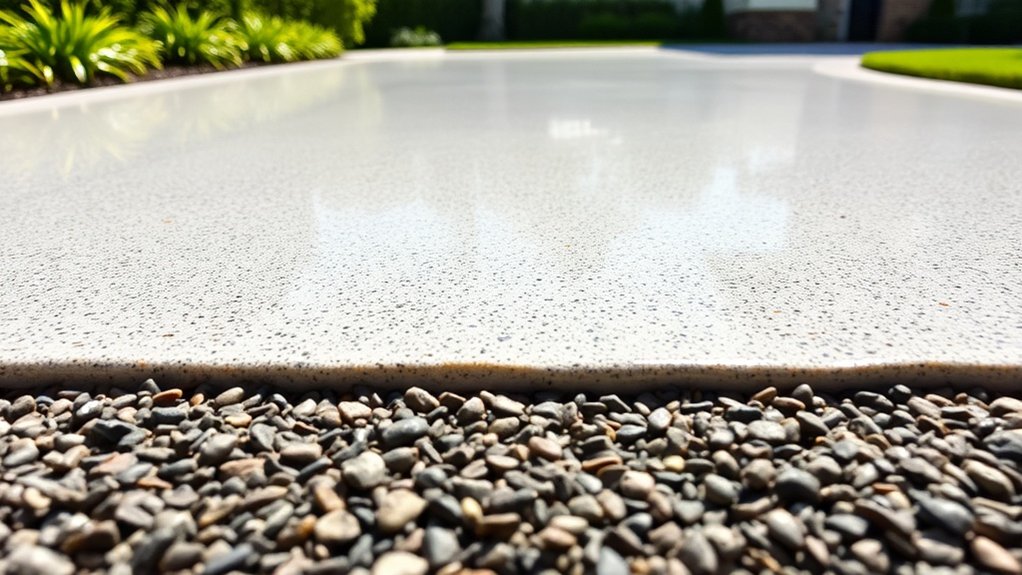
To ensure your resin driveway lasts, follow these straightforward best practices:
- Select the right sub-base: Use MOT Type 3 for optimal stability and compaction.
- Check thickness: Aim for a minimum sub-base thickness of 100mm to avoid settling issues.
- Manage moisture: Ensure the surface is thoroughly dry before applying resin for the best bond.
- Add edge restraints: This stops lateral movement, helping to keep your driveway’s shape and integrity intact over time.
Frequently Asked Questions
How Long Does a Resin Driveway Typically Last?
A resin driveway usually lasts between 15 to 25 years, depending on how well it’s maintained and other factors affecting its longevity. Good installation, high-quality materials, and a solid base can significantly boost its durability and lifespan. For instance, regularly cleaning debris and avoiding heavy vehicle loads can help ensure it stands the test of time.
Can I Install a Resin Driveway Myself?
Yes, you can install a resin driveway yourself. To ensure a successful outcome, follow clear installation guidelines and pay attention to proper compaction and drainage. Many DIY enthusiasts have achieved excellent results, but it’s wise to hire professionals for key steps to prevent expensive mistakes.
What Colors Are Available for Resin Driveways?
Resin driveways come in a range of colour options, including natural tones, blacks, reds, and custom blends. This variety allows you to create a unique look that enhances the visual appeal of your property. For instance, a warm beige can complement a traditional home, while a sleek black adds a modern touch.
How Do Temperature Changes Affect Resin Driveways?
Temperature fluctuations can put strain on resin driveways, causing cracks as the material expands and contracts with the seasons. If the sub-base isn’t strong enough, it can lead to surface damage, especially during rapid temperature changes or extreme weather. For example, a sudden freeze-thaw cycle in winter can significantly impact the integrity of the driveway. It’s important to ensure a robust sub-base to minimise these risks.
Are Resin Driveways Suitable for All Climates?
Yes, resin driveways are suitable for all climates in the UK. They are designed to withstand UV rays, frost, and temperature changes. With proper drainage and a solid sub-base, they perform well in various weather conditions, ensuring long-lasting durability. For example, they won’t crack in the cold winter months or fade under the summer sun. Overall, resin driveways offer reliable performance no matter the season.
Conclusion
Choosing the right sub-base for your resin driveway is crucial; it can mean the difference between a long-lasting surface and one that quickly deteriorates. A well-compacted, permeable base ensures stability and effective drainage, while using inappropriate materials can lead to expensive repairs. By selecting a robust sub-base that meets environmental standards, you improve load-bearing capacity and promote sustainable drainage. In the end, investing in the right sub-base now will save you money in the long run by preventing issues down the line.
Whilst it is true that there are certain conditions required in order to lay a resin bound stone patio, pathway Read more
If your driveway is looking old and tired, a new one can help revamp your property. Modern driveways are available Read more
APPROVED RESIN BOUND DRIVEWAY INSTALLERS LOCAL TO YOU! Find out More Get in Touch Get a Free Quote Book an Read more

